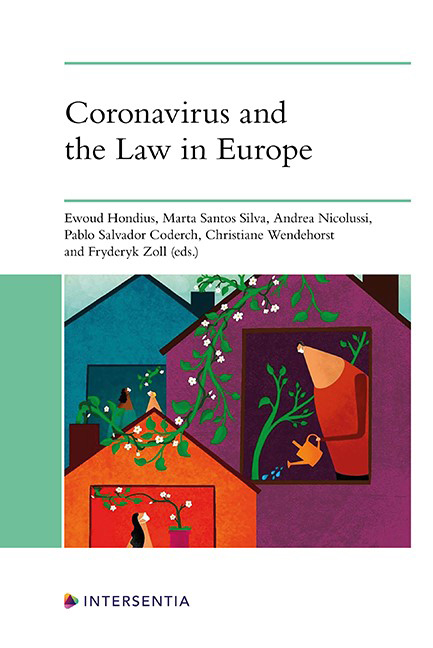Book contents
- Frontmatter
- Preface
- Contents
- List of Keywords
- List of Contributors
- PART I COVID-19 AND FUNDAMENTAL RIGHTS
- PART II STATES AGAINST THE PANDEMIC
- PART III COMPENSATION FOR COVID-19 RELATED DAMAGE
- PART IV CONTRACT LAW
- PART V CONSUMER LAW
- PART VI LABOUR AND SOCIAL LAW
- PART VII CORONAVIRUS CHANGING EUROPE
- Epilogue
- Annex: ELI Principles for the COVID-19 Crisis
- About the Editors
Coronavirus and its Impact on Contracts in Greece
Published online by Cambridge University Press: 10 December 2021
- Frontmatter
- Preface
- Contents
- List of Keywords
- List of Contributors
- PART I COVID-19 AND FUNDAMENTAL RIGHTS
- PART II STATES AGAINST THE PANDEMIC
- PART III COMPENSATION FOR COVID-19 RELATED DAMAGE
- PART IV CONTRACT LAW
- PART V CONSUMER LAW
- PART VI LABOUR AND SOCIAL LAW
- PART VII CORONAVIRUS CHANGING EUROPE
- Epilogue
- Annex: ELI Principles for the COVID-19 Crisis
- About the Editors
Summary
To face COVID-19, this current, exceptional, and unforeseeable pandemic, the extraordinary procedure of enacting Acts of Legislative Content was followed in Greece, a procedure provided by the Greek Constitution in exceptional circumstances. Accordingly, as of the 25 February 2020 to 1 May 2020, nine Acts of Legislative Content were issued. They have been ratified by law and have been followed by a considerable number of ministerial decisions, necessary for their implementation. These acts contain provisions imposing measures for the prevention and limitation of the spread of COVID-19, including the lockdown of enterprises for a certain period as well as provisions for the regulation of such lockdowns to specific contracts. The purpose of the present contribution is to briefly present these provisions as well as the provisions of the Greek Civil Code which apply when events of force majeure, such as the pandemic of the COVID-19, occur.
INTRODUCTION
A pandemic is an epidemic of an infectious disease that has spread across a large region, for instance, across multiple continents or worldwide, affecting a substantial number of people. A widespread endemic disease with a stable number of infected people is not a pandemic. Widespread endemic diseases with a stable number of infected people, such as recurrences of seasonal influenza, are generally excluded from the definition of “pandemic”, as they occur simultaneously in large regions of the globe, rather than being spread worldwide. After the 1918 influenza pandemic (Spanish flu), COVID-19 was added on the list of the current pandemics.
The 2019 – 2020 COVID-19 pandemic is expected to have a profound negative effect on the global economy, potentially for years to come, with substantial drops in Gross Domestic Product (GDP), accompanied by increases in unemployment noted around the world. Apart from its impact on health, the coronavirus has induced a lockdown of economic life in the majority of countries around the world, having a serious impact on everyday life with adverse effects on all aspects of it.
To face COVID-19, this current, exceptional and unforeseeable pandemic, the extraordinary procedure of enacting Acts of Legislative Content was followed in Greece, a procedure provided by the Greek Constitution in exceptional circumstances.
- Type
- Chapter
- Information
- Coronavirus and the Law in Europe , pp. 743 - 758Publisher: IntersentiaPrint publication year: 2021
- 1
- Cited by



